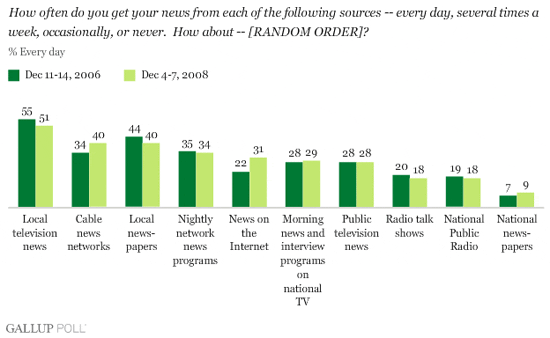 It looks like a chain of Connecticut newspapers that were just days from closure will continue publishing under the guidance of a New Englander. Longtime newspaper executive Michael E. Schroeder (left) has bought the group that includes the Bristol Press, the New Britain Herald and three nearby weeklies. Schroeder was most recently publisher of BostonNOW, a free daily with a promising future that abruptly closed under unusual circumstances last spring. Schroeder was previously with Newsday. There’s no word on what he plans to do with his new possessions, but the papers will continue to publish on their current schedule for now. “We look forward to building upon the rich history of these properties,” reads Schroeder’s quote from the press release.
It looks like a chain of Connecticut newspapers that were just days from closure will continue publishing under the guidance of a New Englander. Longtime newspaper executive Michael E. Schroeder (left) has bought the group that includes the Bristol Press, the New Britain Herald and three nearby weeklies. Schroeder was most recently publisher of BostonNOW, a free daily with a promising future that abruptly closed under unusual circumstances last spring. Schroeder was previously with Newsday. There’s no word on what he plans to do with his new possessions, but the papers will continue to publish on their current schedule for now. “We look forward to building upon the rich history of these properties,” reads Schroeder’s quote from the press release.
Selling Local
Steve Outing has a dozen tips for how newspaper companies can make money. Some are amplifications of his earlier ideas and a few are brand new. Two themes run throughout: create lots of niche products and learn to sell them that way.
It’s the latter theme that doesn’t get as much press as it should. Newspaper industry pundits tend to focus a lot on what needs to be fixed on the editorial side of the house (still plenty) but we don’t read that much about ad sales. While admitting that he’s an editorial guy, Outing addresses that issue repeatedly. Success in the emerging hybrid print/online world demands that ad sales staffs be able to sell targeted advertising aimed at niche interests. This is antithetical to many print sales veterans, who have grown up in a world that demands skill at selling 26-time print schedules to large department stores and cell phone companies.
This is a problem for newspaper companies. In our own experience working at an Internet publisher a decade ago, we found that sales reps recruited out of the print world were often disasters at online sales. They didn’t understand how to define the value of niche markets and they sometimes appeared to believe that signed contracts in the few hundreds or thousands of dollars was beneath them. Yet this is the only way that advertising works online. The most successful print refugees often came from the classified sales field, where success was all about closing lots of small deals.
Outing’s recommendations deserve careful consideration, as do most of his ideas. What he doesn’t address in this column is the thorny issue of how to equip a generation of sales reps with a whole new set of skills. In our experience, it’s difficult at best and often impossible.
Shooting Holes in “Hyper-Local”
Last month, we reported on new Gallup research that shows the Internet closing the gap with local newspapers as people’s preferred news source. Now David Sullivan of “That’s the Press, Baby” has taken Gallup’s own numbers and sketched out a counter-intuitive case that newspaper readership is actually stable or growing among the young people who are widely believed to be abandoning the medium. What’s more, he makes an argument that readers are gravitating to national news and not to the hyper-local content that’s frequently held out as the industry’s salvation.
A big factor could have been last year’s election, Sullivan posits. People just couldn’t get enough of news from the campaign trail, which is too bad because local newspapers were busily paring back national coverage in the name of being more local. There’s no question that national newspapers saw the least erosion in circulation during the last year. Could it be that hyper-local isn’t a obvious as solution as it seems? We weren’t able to give Sullivan’s number-crunching adequate scrutiny, but his logic looks sound. Please have a look and post your comments here.
Here Comes Shirky
 If you haven’t read any Clay Shirky, you’re in for a treat. The NYU adjunct professor and author of Here Comes Everybody has a chat with the Guardian about the future of media that yields several fine quotes:
If you haven’t read any Clay Shirky, you’re in for a treat. The NYU adjunct professor and author of Here Comes Everybody has a chat with the Guardian about the future of media that yields several fine quotes:
- Newspapers “were such a good idea for such a long time that people felt the newspaper business model was part of a deep truth about the world, rather than just the way things happened to be.”
- “The 500-year-old accident of economics occasioned by the printing press – high upfront cost and filtering happening at the source of publication – is over. But will The New York Times still exist on paper? Of course, because people will hit the print button.”
- “Imagine only having one browsing copy of every book in a bookstore. You could say ‘Malcolm Gladwell’s Outliers looks good’, and out pops a brand new copy. Why does a bookstore or a publisher have to be in the shipping and warehousing business?”
Layoff Log
- The Springfield (Mass.) Republican plans to cut 22 full-time and 14 part-time positions, although the cutbacks won’t affect news or sports staffing. There was also some good news for the Republican: it will soon begin printing the Record-Journal from nearby Meriden, Conn. Apparently, the Connecticut paper’s 30-year-old presses were no longer up to the task. The bad news: the Record-Journal is eliminating 24 full-time and 32 part-time jobs.
- The Wyoming Tribune Eagle revealed that it has cut 14 positions in the past year, but didn’t say how many people it employs. Two more were laid off this week.
- Oklahoma’s second largest newspaper will lay off 28 employees, 26 of them in the newsroom. The Tulsa World said the cuts amount to about 5% of the workforce.
- The Anchorage Daily News is shrinking and re-sectionalizing to accommodate smaller issue sizes. Here’s Editor Patrick Dougherty’s super-nice explanation.
Miscellany
Expect many more papers to follow the lead of Detroit’s Free Press and News this year. Hernando Today, a daily produced by The Tampa Tribune, will cut back to five days later this month by eliminating its Monday and Tuesday editions. Founded as a weekly in 1981, Hernando Today went daily in 1996. It covers Florida’s Hernando County.
Detroit-area writer Dave Hornstein has an interesting history of the newspaper wars – or lack thereof – in Detroit. The miserable condition of the two dailies in that city is largely self-inflicted, as Hornstein tells it. The killer was a bitter battle between newspaper management and labor unions that led to a lockout, large circulation declines and $500 million in losses in the late 1990s. Add to that a couple of ownership changes and major modifications to the joint operating agreement and you have two organizations that were severely weakened when the recession hit. Under those circumstances, it’s not surprising that Detroit was the first city to swallow the bitter pill it did last month.
 Richard Pachter says the new book, The Man Who Owns the News: Inside the Secret World of Rupert Murdoch, is well worth a read. The inside scoop on what went on with Murdoch’s Wall Street Journal acquisition is worth the price of admission (a modest $19.77 on Amazon) and the reviewer praises author Michael Wolff for maintaining balance in a book about a man who inspires strong opinions from both fans and foes. Interesting tidbit: while Murdoch’s Fox News is often criticized for its right-wing slant, the media mogul’s Sky News network in the UK has a liberal tone. Murdoch is politically conservative, but his current wife has broadened his thinking.
Richard Pachter says the new book, The Man Who Owns the News: Inside the Secret World of Rupert Murdoch, is well worth a read. The inside scoop on what went on with Murdoch’s Wall Street Journal acquisition is worth the price of admission (a modest $19.77 on Amazon) and the reviewer praises author Michael Wolff for maintaining balance in a book about a man who inspires strong opinions from both fans and foes. Interesting tidbit: while Murdoch’s Fox News is often criticized for its right-wing slant, the media mogul’s Sky News network in the UK has a liberal tone. Murdoch is politically conservative, but his current wife has broadened his thinking.
Steve Yelvington has created The Shutdown List, an interactive timeline of newspaper closures. The site appears to be more of a programming exercise than an actual tracker, but it’s a lot slicker than our lousy RIP list to the left. You can submit your own candidates for inclusion.
Comments
This entry was posted on Wednesday, January 7th, 2009 at 10:10 am and is filed under Facebook, Fake News, Solutions. You can follow any responses to this entry through the RSS 2.0 feed. Both comments and pings are currently closed.




Buffalo News announces new round of buyouts
http://buffalo.bizjournals.com/buffalo/stories/2009/01/05/daily35.html?ana=e_du_pub
The Springfield publisher has the same quote after every round of layoffs, which have happened 3 times in the past 18 months. “We are still the foremost provider of news in the region.” Whatever. I worked for this fool for a year back in 1992-93 and he was the single reason I left that place. Best move I ever made. I knew he was bad news from Day One. Just a few years ago he was singing how his newspaper, unlike others, never laid anyone off. Guess you can’t make that claim anymore.
The trouble with ad staffs as you appropriately mention is they’re not convinced by the so-called small sales online. They just see the commission, and why chase a small commission online vs. a much bigger one in print. Even if somewhere they realize that big print one won’t be there for long. Another major problem, just like on the editorial side with diehard print reporters, is that they fundamentally don’t understand the web and don’t care to. They want gimmicks to sell the online ads for them. Or they go after their usual accounts and don’t think, hey, maybe that guy who always resists the print ad costs would be a perfect fit for a series of online ads! Or, hey, someone’s trying to target an audience that gravitates to one section of our site, let’s sell them an exclusive high priced sponsorship of that whole section! No, it’s just sell the same old ad, stick it somewhere in the print edition and hand me my check.
[…] Connecticut Rescue | Newspaper Death Watch […]
Hyper-local is the future of the printed media if it is done correctly. But, like newspaper Web sites, it is being mishandled. Beyond the Library reading progams, car wrecks and home invasions, the governmental machinations have to be reported in an easy-to-read, understandable format. Dissertations on downtown tax-break zones and references to zoning changes without explanation of the nuances don’t cut it. Hyper-local also doesn’t mean, as one of my former editors seemed to believe, printing a mess of reader-submitted press releases, unedited. The need to cover the small town is there, we just have to find the formula. Big cities, the nation and world are lost to newspapers. They are the province of the Web and TV (for now).